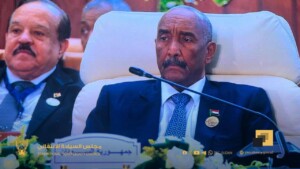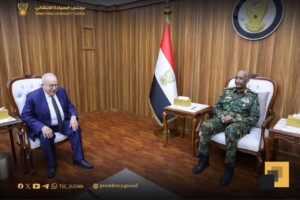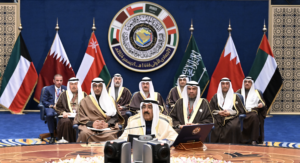Sudan’s PM Hamdok sacks Kassala governor
Prime Minister Abdallah Hamdok dismissed Kassala state Governor Saleh Ammar yesterday. Ammar was appointed three months ago. This immediately led to protests in Kassala.
 Beja Council spokesman Taha Faki at a press conference in Khartoum yesterday (Social media)
Beja Council spokesman Taha Faki at a press conference in Khartoum yesterday (Social media)
Prime Minister Abdallah Hamdok dismissed Kassala state Governor Saleh Ammar yesterday. Ammar was appointed three months ago. This immediately led to protests in Kassala.
Ammar remained in Khartoum and never travelled to Kassala to take up his office as a result of the objections to his appointment by several ethnic groups, especially the Beja.
The Beni Amer and Habab Youth Association announced in a statement yesterday that they plan civil disobedience actions and other protests in Kassala and neighbouring Red Sea state. They hold PM Hamdok responsible for the consequences.
Yesterday evening, protestors blocked roads in Kassala town with burning tires to protest against Ammar’s dismissal.
Disputed
The appointment of Saleh Ammar as governor of Kassala on July 22 immediately triggered protests in the state. Hadendawa nazir Sayed Tirik fiercely condemned the appointment of the new governor. He warned that they would increase the protests “until Khartoum reverses its decision”.
A month later, clashes broke out in Kassala town, when Hadendawa tribesmen attacked a group of Beni Amer who organised a march in the town to support their fellow tribesman Saleh Ammar. The fighting continued for days, and left at least six people dead.
Ammar recently proposed an initiative to achieve peace and social coexistence in the eastern region.

The eastern Sudanese Beja tribe consists of a large number of clans. Voices among them say that the Beni Amer and El Habab tribes should be excluded, as they speak Tigre, not Beja. Others never recognised Beni Amer and El Habab tribesmen as Beja, and feel that they are not entitled to be called ‘eastern Sudanese’.
Beni Amer chief
Chief nazir* of the Beni Amer, Ali Diglel, described the decision to dismiss Ammar as “shameful, because the campaign calling for his removal is based on racist arguments, distrust, and the slandering of our identity”.
In a statement on Tuesday, Diglel said that the deciscion to remove the governor “represents a reward for those who threaten social peace, and use a racist discourse.” It is “a manifestation of the targeting of tribes”.
The Beni Amer nazir holds the authorities in Khartoum “fully responsible for any repercussions that might occur as a result of the decision to dismiss the governor, in light of the current tensions”, and called on the government “to take serious steps to find the necessary remedies for the flawed dismissal”.
He said that he objects to protests that threaten the security in the region in order to obtain political gains, and called on his tribesmen to restrain themselves. “We continue to demand that the issue of the governor be addressed in a holistic framework in order to avoid further tension.”
Beja Nazirs Council
The spokesperson for the Beja Nazirs Council, Taha Faki, downplayed the importance of the dismissal. “The decision was long overdue and did not concern us anymore,” he said in an interview with Radio Dabanga. “We did not even demand it anymore in our recent meeting with the head of the Sovereign Council and his deputy.”
Faki further said that a government decision can be expected that will “freeze” the eastern Sudan track protocol in the Comprehensive Peace Agreement, signed in the South Sudanese capital Juba on October 3 by the Sudanese government and the Sudan Revolutionary Front rebel alliance. The eastern Sudan track accord was already controversial when it was signed in February this year.
In July, the government established a committee to re-discuss the track deal at the request of eastern Sudanese leaders, “to resolve the disputes resulting from a lack of coordination and consultation” during the peace talks. Beja leaders organised a Peace, Development, and Justice Conference at the end of September, that demanded self-determination for Red Sea state, Kassala, and El Gedaref.
Sovereign Council
Last Wednesday, Head of the Sovereign Council Lt Gen Abdelfattah El Burhan said he needed two days to propose a solution to the impasse around the eastern Sudan track agreement.
Beja spokesperson Faki described their meetings with Sovereign Council head El Burhan and Vice President of the Sovereign Council Lt Gen Mohamed Hamdan ‘Hemeti’, who is also Commander of the paramilitary Rapid Support Forces, as positive. “A number of committees formed to study the eastern Sudan track file have already started their work.”
Faki said that they held a second meeting with Hemeti yesterday evening to discuss their demands, as El Burhan assigned the file to his deputy. The Beja delegation demanded the replacement of Sovereign Council member Lt Gen Ibrahim Jabir as chairman of the team that is preparing the Eastern Sudan Consultative Conference, which will be organised under Hemeti’s responsibility.
“Lt Gen Jabir failed in dialogue and communication, while Lt Gen Hemeti is the best person suited to head the committee, because of the way he handled the peace file, and because he understands the region's issues,” he stated.
According to Faki, the Consultative Conference must be attended by representatives from all eastern Sudanese localities. Yet, he expects the conference will come up with results similar to the recent Sinkat conference, organised by the Beja Nazirs Council at the end of September. The participants of that conference demanded self-determination. “Our opinion will prevail as we represent the majority.”
Khaled Idris, leading member of the United Popular Front for Liberation and Justice, said that the eastern Sudan protocol of the Juba Peace Agreement “cannot be frozen”.
In a press statement on Tuesday, he stated that cancellation of the eastern Sudan track deal would mean that the entire peace agreement be nullified. “The agreement is a single package and no party has the right to cancel it.”
* A nazir is a state-appointed administrative chief of a tribe, according to the Native Administration system in Sudan.
Radio Dabanga’s editorial independence means that we can continue to provide factual updates about political developments to Sudanese and international actors, educate people about how to avoid outbreaks of infectious diseases, and provide a window to the world for those in all corners of Sudan. Support Radio Dabanga for as little as €2.50, the equivalent of a cup of coffee.












 and then
and then